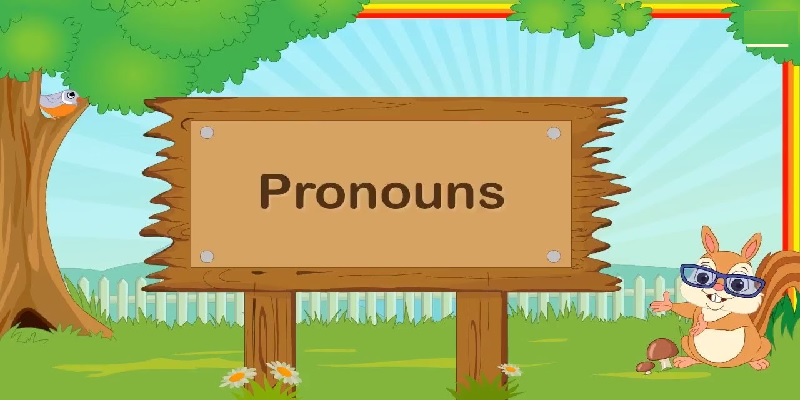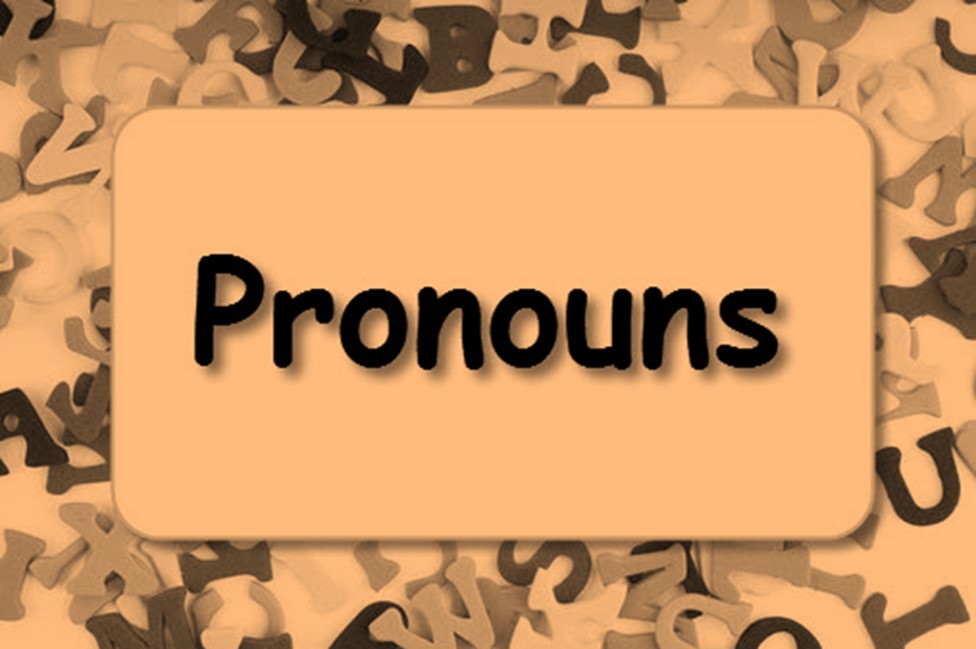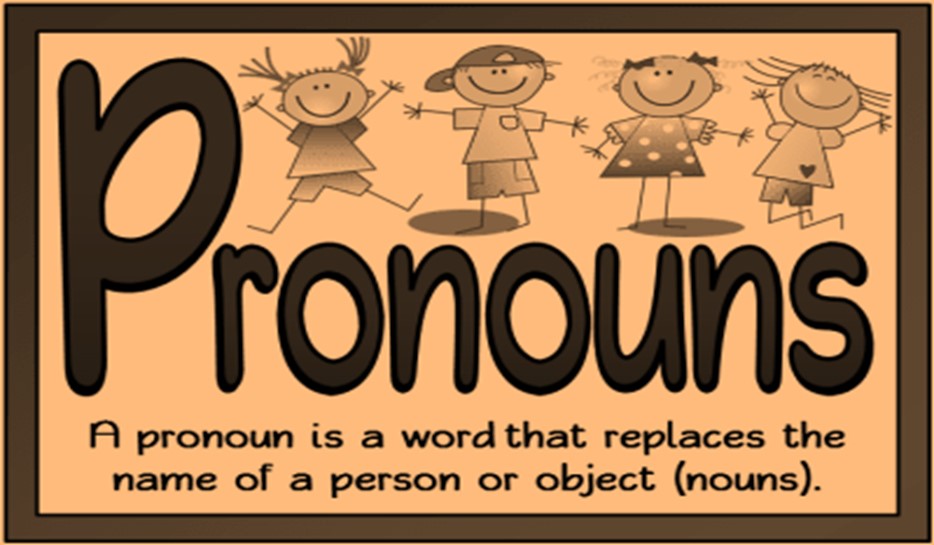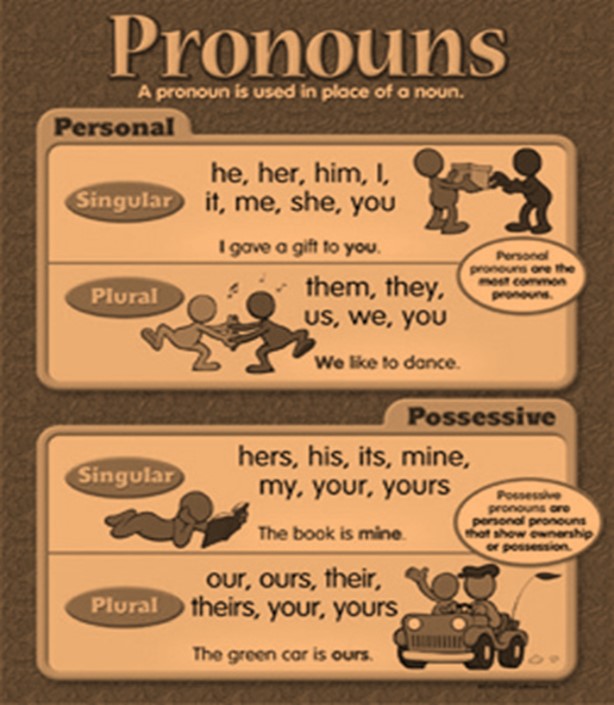
Nouns are used to identify a person, place, animal, thing or an idea. But if you are using too much of these nouns in every sentence then it will sound a bit weird. For instance, consider that you are talking to someone about your brother, Vihaan’s wedding. Then, for how many time will you use the word Vihaan? Vihaan is a proper noun which you are required to mention in the starting of the sentence but won’t it sound weird if you use to mention him through his name in every sentence?
“I had gone to Gujarat for my brother Vihaan’s wedding. Vihaan looked amazing in the outfit which he was wearing and Vihaan’s wedding was just awesome. The whole family had a great time in Vihaan’s wedding."

Isn’t the same a bit weird? If so, then what to do?
To replace the word Vihaan in the sentence we can use words like him, his and in the sentence. Now, have a look at the sentence
“I had gone to Gujarat for my brother Vihaan’s wedding. He looked amazing in his outfit and his wedding was awesome. The whole family had a great time in his wedding."
Doesn’t it sound well now?
These words he, him and his which you used in the sentence to avoid the repetitive use of the common noun Vihaan are known as Pronouns.
Now the question is what actually are pronouns?
Definition of Pronouns
Pronouns are defined as the words which replace nouns in any sentence. They basically avoid the repetitive use of nouns in the sentence.

Classification of Pronouns
For simplicity, pronouns are classified into two types that are personal pronoun and possessive pronoun, but the actual classification of pronouns includes its nine types.
 Pronouns are broadly classified into nine categories namely,
Pronouns are broadly classified into nine categories namely,
Now, we will know about all these pronouns one by one.
Personal Pronouns basically replaces proper noun. They take place the position of a specified person, place or a thing in a sentence. His, hers, theirs, mine, me, she, I, he, you are all the examples of personal pronouns.
Antecedents the nouns or the noun phrases which is mentioned in the beginning of any sentence. It is then replaced with a pronoun. This type of pronoun is known for its versatile nature. Antecedents will become clear with the following example:
Shivangi said that she has completed her homework.
In this sentence Shivangi is an antecedent and she is the pronoun used to replace the antecedent in the sentence.
Relative Pronouns start with a subordinate clause that is the independent clause and then relates it with the relative clause. Who, that, which, whom are the examples of the relative pronoun.
Subject and Object Pronouns are those with which people usually get confused.
Subject pronouns deal with “Who" that is who is doing the task or who is the being talked about. For instance, Mr. Sharma has brought new clothes for his wife. Then Mr. Sharma is the performing the task and so it is a subject pronoun. Other examples of subject pronoun include I, they, she and we.
While the object pronouns deal with “Whom" that is the work or the task has to be done for which person (whom). For instance, kindly forward the mail to me. Here, the task is done for you. So, “me" is an object pronoun. Other examples of object pronouns are him, us, me, and them.
Demonstrative Pronouns are quite specific. They replace the nouns which have already been mentioned in a sentence. That, this, these, those are the examples of demonstrative pronouns.
Indefinite Pronouns aren’t specific. They are used when one needs to refer a thing or a person which or who isn’t specified or mentioned anywhere. Everybody, somebody, no one, each, all, every, none are the examples of the indefinite pronouns.
Reflexive and Intensive Pronouns are one of the easiest pronouns.
Reflexive pronouns include –self at the end. For example, myself, yourself, himself etc. while the intensive pronouns are used to emphasize on the antecedent or the noun. Now carefully look at the two sentences,
(i) Siddharth praised himself for his good marks in the final examinations.
(ii) Mr. Sharma built his house all by himself.
In the first sentence there is no emphasis made and so it is the example of reflexive pronoun. But in the second sentence “Mr. Sharma built his house" and “Mr. Sharma built his house all by himself" have similar meanings but the word himself, indicates that Mr. Sharma is solely responsible for making his house, thus an emphasis is developed in the second sentence so it is an example of intensive pronoun.
Possessive Pronouns reflect ownership. My, our, mine, ours, yours, his, hers, theirs are all the examples of possessive pronouns.
Interrogative Pronouns are to ask questions. Who, whom, what, why are the examples of the interrogative pronouns.
Recap
So, this was all the basics of pronouns. Hope this makes your concepts clearer!
Q.1 |
State the type of pronoun which is in braces. After a few minutes, the jury gave "its" verdict. |
| a) | Intensive |
| b) | Relative |
| c) | Demonstrative |
| d) | Personal |
Q.2 |
State the type of pronoun which is in braces. Rama and Harsh work hard. They are praised by "their" teacher. |
| a) | Intensive |
| b) | Demonstrative |
| c) | Relative |
| d) | Personal |
Q.3 |
State the type of pronoun which is in braces(" "). "That" is the Red Fort. |
| a) |
Relative |
| b) | Personal |
| c) | Reflexive |
| d) | Demonstrative |
Q.4 |
State the type of pronoun which is in braces(" "). "Each" of the men received a reward. |
| a) |
Personal |
| b) | Relative |
| c) | Demonstrative |
| d) | Distributive |
Q.5 |
State the type of pronoun which is in braces(" "). I have found the book "which" I lost. |
| a) |
Reciprocal |
| b) | Interrogative |
| c) | Relative |
| d) | Demonstrative |
Q.6 |
State the type of pronoun which is in braces(" "). This is the house "which" belongs to my uncle. |
| a) |
Reciprocal |
| b) | Distributive |
| c) | Relative |
| d) | Interrogative |
Q.7 |
State the type of pronoun which is in braces(" "). Give "me" my book. |
| a) |
Distributive |
| b) | Demonstrative |
| c) | Relative |
| d) | Personal |
Q.8 |
Fill in the blanks with correct pronouns. __ have found the umbrella. |
| a) | I |
| b) | We |
| c) | They |
| d) | All of these |
Q.9 |
Fill in the blanks with correct pronouns. It is an ill wind ____ blows nobody good. |
| a) | Him |
| b) | They |
| c) | That |
| d) | Their |
Q.10 |
Spot the error in the following sentences. Jenny and Jody gave his statement. |
| a) | Gave |
| b) | And |
| c) | Statement |
| d) | His |
Your Score: 0/10
Yearlong program for Olympiads preparation & to build necessary skills for future.
Explore More
Time to mark your calendar with the upcoming Olympiads exam schedule.
Explore More
Take your Olympiad preparation to next-level by taking LIVE Classes.
Explore More
Assess your performance by taking topic-wise and full length mock tests.
Explore More
Online tuitions for international compeitions like SASMO, SEAMO, etc for Grades 1-11.
Explore More